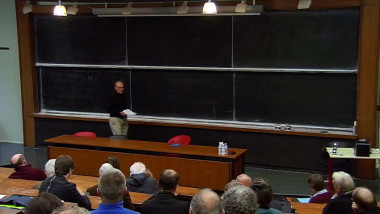The best of both worlds: combining population genetics and quantitative genetics models
Appears in collection : 2022 - T1 - WS3 - Mathematical models in ecology and evolution
Joint work with Sally Otto and Vincent Calvez.
Traits under migration-selection balance are shown to exhibit complex patterns of genetic architecture, with allelic di˙erences of varying magnitude. However, studying the in˛uence of a large number of small allelic e˙ects on the maintenance of spatial polymorphism in a model that also accounts for demographical changes is mathematically challenging, due to the high complexity of the systems that arise. Here we propose a new methodology that allows us to take into account the combined contributions of a major locus and of a quantitative background resulting from small e˙ect loci, inherited according to the in˝nitesimal model. In a regime of small variance contributed by the quantitative loci, we found new arguments of convex analysis to justify that traits are concentrated around the major alleles e˙ects according to a normal dis-tribution, which leads to a slow-fast analysis approach. By applying it to a symmetrical two-patch model, we predict an undocumented phenomenon of loss of polymorphism at the major locus despite strong selection for local adaptation under some conditions, where the in˝nitesimal quantitative background slowly disrupts the fast established symmetrical polymorphism at the major locus, which is con˝rmed by individual-based simulations. We also provide a comprehensive toolbox designed to describe how to apply our method to more complex population genetic models.












